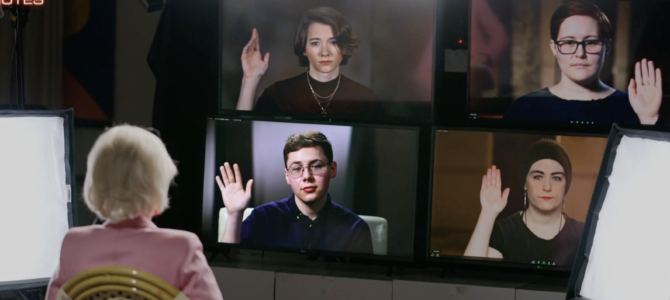
CBS’s “60 Minutes” aired a segment Sunday night interviewing a number of individuals who, after undergoing hormone treatments and sex “reassignment” surgeries, decided to “detransition” back to their natural sex. Despite “60 Minutes” framing the story around transgender health-care access and critiquing a number of recent bills introduced at the state level to protect minors from experimental treatments, LGBTQ activists denounced CBS’s reporting as “ridiculous” “fearmongering.”
CBS correspondent Lesley Stahl interviewed individuals who all fully “transitioned” to the opposite gender, then “destransitioned” when they realized they still felt “incomplete,” or more depressed after they “transitioned” than before. They told Stahl they felt they were “blindly affirmed.”
Grace Lidinsky-Smith, who decided to transition in her early 20s, explained how she quickly and easily started testosterone treatments after just a couple of sessions with an online therapist. “I can’t believe I transitioned then detransitioned, including hormones and surgery, in the course of like, less than one year,” she said.
60 Minutes highlights transgender people who have decided to de-transition and I’m sure it won’t be seen as controversial in the least. pic.twitter.com/vetbQFe3Oo
— Jason Rantz on KTTH Radio (@jasonrantz) May 24, 2021
Stahl spoke with a youth gender psychologist who admitted her colleagues are afraid to speak up about the short timeline in which minors are able to undergo treatment “because we are afraid of not being seen as affirming … or doing something to hurt the trans community.”
Indeed, that’s exactly how these stories of “blindly affirming” trans youth are treated by the LGBTQ movement. Compelling stories of people struggling with gender identity are too dangerous to be told, according to many LGBTQ activists, because they undermine the narrative that a person’s desire to “transition” should never be questioned.
GLAAD, which bills itself as “a protest against defamatory coverage of LGBT people,” immediately lashed out at “60 Minutes” on Twitter after the segment aired. The organization called the reporting “shameful” and claimed, “the majority of the story was devoted to ‘raising concerns’ about youth access that care.”
As the piece noted, every major medical association supports affirming, age-appropriate care for trans youth and the guidelines for that care are safe and well-established. And yet, the majority of the story was devoted to "raising concerns" about youth accessing that care. (2/7)
— GLAAD (@glaad) May 24, 2021
Yes, the majority of the story was devoted to “raising concerns,” but not about preventing youth access to gender therapy. Producers were more than generous with the air time given to transgender activists who are concerned that state legislation could block minors from testosterone, estrogen, or undergoing the knife.
The very first interview, and featured throughout the segment, is with Erica Anderson, a transgender woman and gender psychologist Stahl labels as “highly respected.” Stahl leads the segment with letting Anderson establish that anyone fighting to protect minors from experimental treatment is “demonstrating their ignorance and prejudice.”
Furthermore, CBS anticipated such virulent pushback from the transgender community for even acknowledging the existence of people who “detransition” that they posted a story about their story on their website called, “Inside the 60 Minutes report on transgender health care issues.” In it, CBS attempts to appease activists by reiterating that they “wanted to keep it focused on health care and not make it a political story.” (Even though Stahl opens the segment stating the bill is “part of a new culture war.”)
In their story on their story, they even share the transgender activists’ anticipated talking points on how “dangerous” hearing stories of “detransition” could be. The report reads:
Alphonso David, an advocate for the transgender community, a LGBTQ civil rights lawyer, and the president of the Human Rights Campaign (HRC), told Stahl in an interview that he was concerned that reporting on those who choose to detransition could be ‘taken out of context [and] could further victimize and marginalize’ the transgender community.
Even with all the preemptive hand-wringing and caveats, “60 Minutes” could not prevent the pushback. GLAAD claimed reporting on this dramatic influence of internet culture on minors “wrongfully implied that trans YouTubers and online communities which affirm trans youth are somehow brainwashing kids and turning them trans.”
Chase Strangio, a deputy director at the American Civil Liberties Union who is also transgender, blasted “60 Minutes” for “overemphasizing the exceedingly tiny percentage of people who had access to care and regret it.”
And this Network and program chose to run a story that is part of the anti-trans playbook overemphasizing the exceedingly tiny percentage of people who had access to care and regret it. Like the “abortion regret” stories, this is the weaponization of personal pain to hurt others.
— Chase Strangio (@chasestrangio) May 24, 2021
One activist even questioned the legitimacy of the “detransitoner” stories because “60 Minutes” would not tell him how they found the individuals.
When I spoke with @60Minutes about their “detransition” story and asked where they found the people to profile – they refused to tell me and became defensive.
We still don’t know if they searched for people on TERF forums, and transparency would be appreciated.
— Jack Turban MD (@jack_turban) May 25, 2021
There is a reason the transgender movement unleashed such immediate and intense pushback for even a mild attempt at highlighting instances of disappointment and regret, and it’s because these stories are true. If “detransitioning” wasn’t a growing trend and did not undermine so much of the transgender movement’s message, then by their own logic, they would let them “live their truth.” Maybe even add another letter to the LGBTQQIP2SAA community that supposedly affirms all non-traditional patterns of sexuality and gender.
“Detransition” testimonies expose what so many parents suspect, but are too afraid to say – that maybe they shouldn’t allow their teen to chemically or physically castrate themselves at the first sign of confusion. As this issue enters more statehouses across the country, we need more journalists digging into what happens when we “blindly affirm” minors. These stories are not “dangerous” or “fearmongering,” they are crucial.








